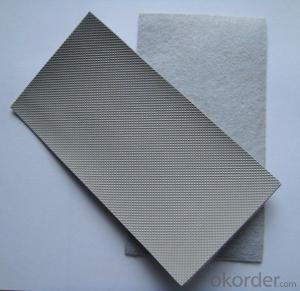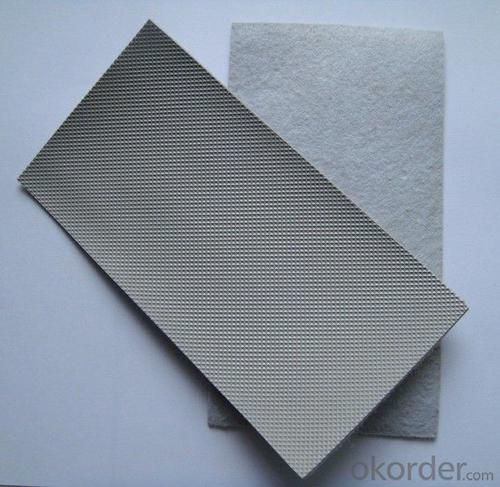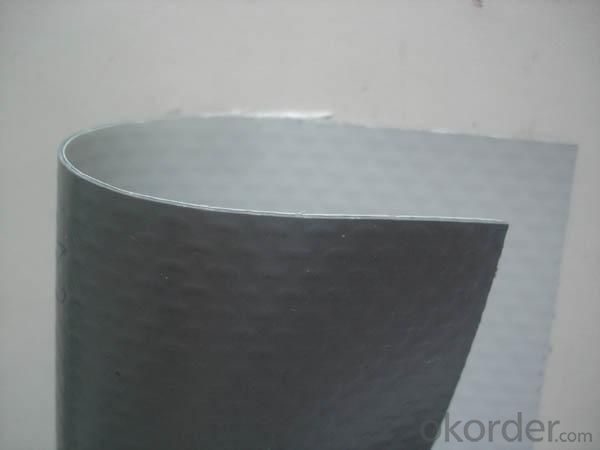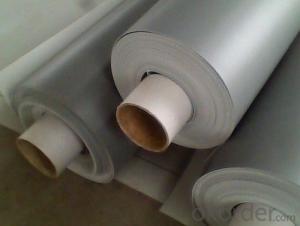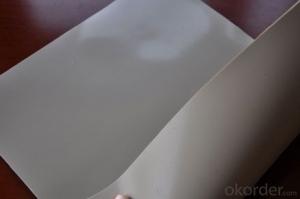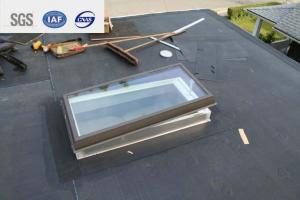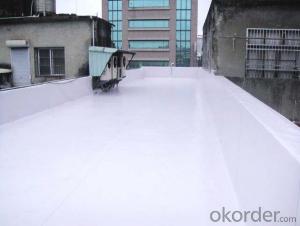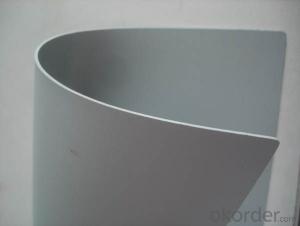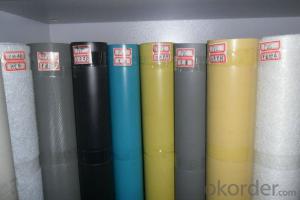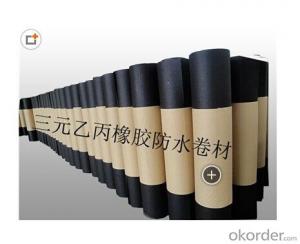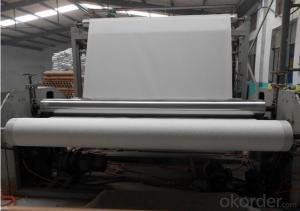PVC Waterproofing Membrane for Construction
- Loading Port:
- China main port
- Payment Terms:
- TT OR LC
- Min Order Qty:
- 5000 m²
- Supply Capability:
- 100000 m²/month
OKorder Service Pledge
OKorder Financial Service
You Might Also Like
Introduction for PVC Waterproofing Membrane
Excellent anti-aging property.
Puncture- resistant.
Welding construction,
High tensile strength, good elongation, good dimensional stability.
Good plasticity.
It has self-extinguishing from fire property.
Materials surface is smooth, fast color, stain resistance.
More wide, Wastage become less when being used.
1.Technical data of PVC Membrane
Item | Specification |
Length | 20m |
Width | 1.05m, 2.05m,2.1m |
Thickness | 0.8mm,1.0mm;1.2mm;1.5mm;2.0mm |
2.Characteristic of PVC Membrane
1.Strong tensile strength, high elongation, can fit big deformation of substrates.
2.Excellent anti-extreme weather property, can adapt to various environment temperature difference.
3.Suitable for exposed projects with long lifetime and good anti-aging property.
4.Can be welded firmly and reliably.
5.Outstanding root penetration resistance, best choice for planted roofs.
6.Simple and fast construction without pollution.
7.Great plasticity and fast treatment with corners and details.
3.Applicable scope of PVC Membrane
PVC sheet forms an effective barrier to liquid water or water vapor in the roof construction for industrial and civil engineering, underground engineering such as subway& tunnel, water conservancy such as water pools & ditch, shelter, grain depot, land filling, dyke, sewage treatment and basement.
4. FAQ of PVC Waterproofing Membrane
a.Can we get some samples before place order?
Answer: We can send the free samples to you by freight collect.
b.How many years can your PVC membrane guarantee?
Answer: We will guarantee the quality for 5 years at least.
c.Which countries you ever export the product?
Answer: We export the PVC membrane to South Africa, Middle east and even European countries.
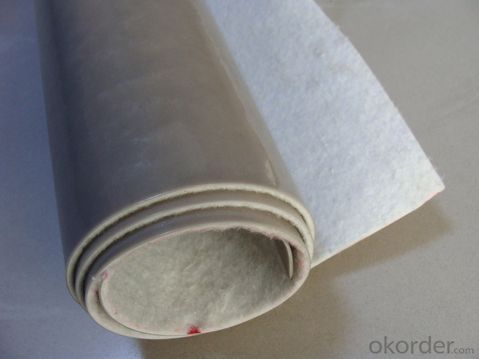
- Q: Can a waterproofing membrane be used for temporary structures or tents?
- Indeed, temporary structures or tents can benefit from the utilization of a waterproofing membrane. These membranes are specifically crafted to create a safeguarding shield against water, thwarting any potential harm caused by water infiltration. Consequently, they prove to be an excellent selection for temporary structures or tents, ensuring that the interior remains dry in inclement weather or damp environments. Furthermore, the lightweight and pliable nature of waterproofing membranes simplifies their installation and removal, which is particularly advantageous for temporary structures or tents that necessitate relocation or disassembly.
- Q: Can a waterproofing membrane be used in residential buildings?
- Yes, a waterproofing membrane can indeed be used in residential buildings. In fact, it is highly recommended as it provides an effective barrier against moisture, preventing water damage and mold growth. Waterproofing membranes are commonly used in areas prone to water exposure such as basements, bathrooms, roofs, and balconies. They are typically applied on the exterior or interior surfaces, creating a protective layer that prevents water infiltration. This helps to maintain the structural integrity of the building, extend its lifespan, and enhance the overall comfort and safety of the residents. Therefore, using a waterproofing membrane in residential buildings is a wise investment to protect against potential water-related issues.
- Q: Can a waterproofing membrane be used for a shower pan?
- Yes, a waterproofing membrane can be used for a shower pan. It helps to prevent water leakage and protect the underlying structure from moisture damage.
- Q: Can a waterproofing membrane be used for a foundation wall damp proofing?
- Indeed, foundation wall damp proofing can be achieved by utilizing a waterproofing membrane. The purpose of a waterproofing membrane is to obstruct the flow of water, thus serving as a shield between the foundation wall and the adjacent soil. This protective shield aids in averting moisture seepage into the foundation wall, which can result in dampness and potential water harm. Through the application of a waterproofing membrane onto the foundation wall, an effective damp proofing is achieved, guarding it against water intrusion. Nevertheless, it is crucial to ensure that the installation of the waterproofing membrane is executed accurately, and that all joints and seams are adequately sealed to establish an uninterrupted barrier against water.
- Q: Can a waterproofing membrane be used for oil or gas industry applications?
- Yes, a waterproofing membrane can be used for oil or gas industry applications. Waterproofing membranes are designed to provide a barrier against water penetration, which can be beneficial in industries where oil or gas leaks and spills are a concern. These membranes can help prevent water from seeping into underground storage tanks or pipelines, protecting them from corrosion and potential environmental contamination. Additionally, waterproofing membranes can be used in areas where oil or gas may come into contact with water, such as containment areas or waste treatment facilities, to ensure that no substances leak into the surrounding environment. Overall, waterproofing membranes offer a reliable solution for protecting oil or gas industry infrastructure from water-related damage and can contribute to maintaining the integrity and safety of these operations.
- Q: How does a waterproofing membrane adhere to the surface?
- A waterproofing membrane adheres to the surface through a combination of mechanical and chemical bonding. The membrane is typically applied using a specialized adhesive or primer that helps create a strong bond between the membrane and the surface it is being applied to. The mechanical bonding occurs as the adhesive or primer penetrates into the pores of the surface, creating a physical bond between the membrane and the substrate. This helps ensure that the membrane is securely attached and able to withstand the forces it will encounter. Chemical bonding also plays a crucial role in the adhesion process. The adhesive or primer contains chemicals that react with the surface, forming chemical bonds with the membrane. This chemical reaction helps create a durable and long-lasting bond that can withstand environmental factors such as temperature changes, moisture, and UV exposure. Additionally, the composition of the waterproofing membrane itself plays a role in its adhesion. Many membranes are made of materials with inherent adhesive properties, such as bitumen or rubberized asphalt. These materials have natural tackiness, which allows them to adhere to the surface without the need for additional adhesives or primers. Overall, the adhesion of a waterproofing membrane to a surface is a combination of mechanical and chemical bonding, achieved through the use of specialized adhesives or primers. This ensures a strong and durable bond that effectively protects the surface from water damage.
- Q: What are the requirements for frost resistance of basement floor polymer waterproofing membranes?
- Requirements are, when the material quality testing, the ground temperature must meet the requirements of national norms.
- Q: Are waterproofing membranes resistant to saltwater corrosion?
- Yes, waterproofing membranes are generally resistant to saltwater corrosion. They are designed to withstand harsh environmental conditions, including exposure to saltwater, without deteriorating or being affected by corrosion.
- Q: Does a waterproofing membrane require any special precautions during installation?
- Yes, a waterproofing membrane does require special precautions during installation. It is important to ensure that the surface to be waterproofed is clean, dry, and free from any contaminants or loose materials. The membrane should be installed in accordance with the manufacturer's instructions, paying attention to proper overlap and seam sealing. It is also crucial to inspect the membrane for any damage or defects prior to installation. Additionally, proper safety measures should be taken, such as wearing protective clothing and using appropriate tools and equipment.
- Q: Are waterproofing membranes resistant to punctures?
- Yes, waterproofing membranes are designed to be resistant to punctures. They are typically made from durable materials that can withstand external forces without tearing or puncturing, ensuring long-lasting protection against water intrusion.
Send your message to us
PVC Waterproofing Membrane for Construction
- Loading Port:
- China main port
- Payment Terms:
- TT OR LC
- Min Order Qty:
- 5000 m²
- Supply Capability:
- 100000 m²/month
OKorder Service Pledge
OKorder Financial Service
Similar products
Hot products
Hot Searches
Related keywords
